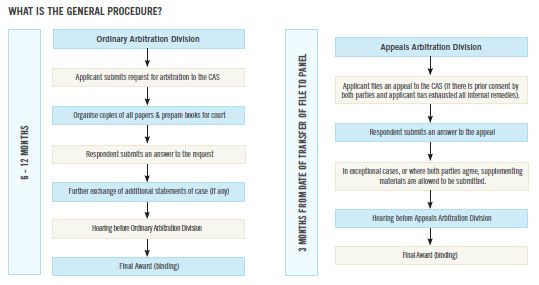Peru may not have had much success at the World Cup, but their captain Paolo Guerrero achieved a considerable legal victory in even making it to Russia this summer.
Guerrero was facing a 6-month suspension after he tested positive for cocaine metabolite benzoylecgonine, which he maintains was involuntarily ingested through coca tea. On an appeal by the World Anti-Doping Association (WADA) to the Court of Arbitration for Sport (CAS), his suspension was increased to 14 months. This would have ruled Guerrero out of the World Cup, his country's first in 36 years, had it not been for the last-minute intervention of the Swiss Federal Tribunal (SFT) in temporarily staying the suspension until after the World Cup.
WHAT IS THE CAS?
Often referred to as 'sport's supreme court', the CAS is regarded as one of the most important dispute resolution bodies for sports disputes worldwide. Based in Switzerland, it seeks to resolve sports-related disputes through arbitration and mediation. About 300 cases a year are referred to the CAS.
It is divided into two divisions: an Ordinary Arbitration Division that determines general sports-related disputes, including contractual disputes; and an Appeals Arbitration Division that determines appeals from the decisions of sports-related bodies.
HOW DO YOU BRING A CASE TO THE CAS?
Either party to a sports-related dispute, be it directly or indirectly linked to sport, may submit the dispute to the CAS, provided both parties have previously agreed in writing to this. Most sports related contracts include a term to this effect.
A party can also appeal to the CAS from a decision of a sports body where the rules of that body allow them to do so, and they have exhausted all internal remedies provided for by the rules. The rules of the Football Association of Ireland and the Olympic Council of Ireland provide for this in specific circumstances, for example.
As we saw in Guerrero's case, WADA has an automatic right to appeal to the CAS in doping cases where the relevant sporting organisation has implemented the World Anti-Doping Code 2015. The Olympic Council of Ireland, Sport Ireland, and the Paralympic Council of Ireland have all implemented the Code.

HOW DOES THE CAS DETERMINE DISPUTES?
A dispute may be heard by one arbitrator or a panel of three. Where the parties cannot agree, the President of the relevant division of the CAS decides.
The panel has full power to review both the law and facts of the dispute, and to determine who should bears the costs, or how the costs should be shared between the parties.
In the case of a dispute under the ordinary procedure, the panel decides the dispute according to the law agreed by the parties, or, absent agreement, according to Swiss law. Alternatively, the parties may authorise the panel to decide the dispute according to what is fair and good, free from any set rules or law.
In the case of an appeal, the panel has primary regard to the relevant sport body's rules or regulations and to the law chosen by the parties. Absent agreement, the law of the country in which the relevant sports body is based applies or, alternatively, the panel can apply whatever rules or law it deems appropriate.
Any award made by the CAS is final and binding on both parties, and carries the same authority as a judgment of an ordinary court. An award is made by majority decision or, if no majority is reached, by the President of the panel. Dissenting opinions are not recognised.
CAN A DECISION OF THE CAS BE APPEALED?
Decisions of the CAS may be appealed to the SFT, but can only be overturned on very limited grounds. An appeal to the SFT must be made within 30 days of notification of the CAS decision.
In Guerrero's case, the SFT found that the extension of his suspension from 6 months to 14 months – for which reasons are yet to be issued by the CAS– was unjustified and so provisionally deprived it of effect.
In granting the temporary stay, the SFT noted that FIFA did not "categorically oppose" Guerrero's participation in the World Cup, and also that the player would suffer personally if he was unable to captain his team. Interestingly, it also had regard to the fact that the captains of Peru's group stage opponents had urged FIFA to interrupt the ban.
Whilst Guerrero's battle against his ban will rumble on, his success in delaying its commencement to allow him to fulfil his career ambition will be of particular interest to all athletes, their advisors and sporting federations.
This article contains a general summary of developments and is not a complete or definitive statement of the law. Specific legal advice should be obtained where appropriate.




